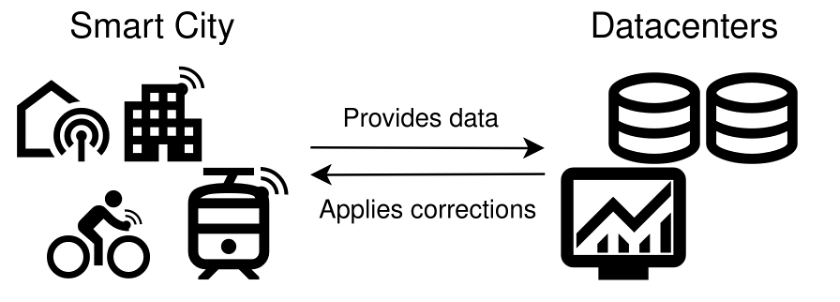Smart Cities and the Data Challenge: Balancing Innovation with Privacy
Smart cities promise to revolutionize urban life through data-driven solutions, but at what cost? While cities worldwide implement sensors and AI to optimize everything from traffic to energy, new ethical challenges emerge around privacy and surveillance.
What are «smart cities»?
The “smart city” initiative involves using various types of electronic sensors in urban areas to collect data, which is then used for more effective and stable resource and asset management. This strategy integrates information and communication technologies, along with various electronic devices, to optimize the management of urban infrastructure and services. Such ambitious projects serve to solve complex problems, but at the same time, generate new ethical, social and technical challenges, expanding our understanding of the meaning and boundaries of human freedom.

Specifically, the “smart city”[1],[2],[3] initiative includes reducing traffic congestion, improving parking, optimizing public transportation, and reducing travel time. In the context of social life, this project involves monitoring law enforcement and more efficient management in emergency situations. From an ecological standpoint, the project aims to reduce energy consumption and increase the use of renewable energy sources. More convenient transportation systems, more efficient city services, and more democratic decisions in city management are all ambitious goals of this initiative.
Key components of this strategy include the comprehensive and secure use of ICT infrastructure, data centers and cloud computing, Internet of Things (IoT) devices, advanced analytics and Artificial Intelligence technologies, “smart” homes and roads, integrated transportation systems, electronic governance, broad community involvement, effective and transparent strategic planning, and collaboration between government and business, with a focus on protecting citizens’ rights.
Global Success Stories
Currently, this initiative is being successfully implemented in Singapore[4] for transportation systems, water supply, and urban planning. In Dubai[5] the initiative is used for faster and safer transactions, increasing data exchange and use. Amsterdam[6] implements this project as a community initiative to improve energy efficiency and enhance urban life. In Barcelona[7] the project includes smart lighting and waste disposal, parking monitoring, and environmental quality. Copenhagen[8] with its advanced bicycle infrastructure and green homes plans to become carbon-neutral by 2025. In Stockholm[9] the “smart city” is focused on digital education, healthcare, transportation, energy efficiency, and plans to completely phase out fossil fuels by 2040. For Tokyo[10] the primary goal of implementing this project is resilience, safety, and improving the efficiency of city services. New York[11], London[12], and Helsinki [13] are implementing the “smart city” project as improvements in connectivity, efforts in the field of open data, and digitization of various spheres of social life.
Risks and Challenges
Along with the obvious advantages of these projects, it is important to note a number of potential risks. These include risks associated with privacy protection and the use of surveillance, vulnerability to cyber attacks, digital divide between people who have access to the system and its benefits and those who do not have the technical means of access and necessary skills, high implementation costs, difficulties in integration and communication, dependence on technology and the complexity of solving non-standard problems, data management and ownership rights, the need for more innovative technologies and their rapid obsolescence, environmental challenges in the process of testing and implementing the project, and public skepticism and distrust.
Ethical Concerns in Smart City
From an ethical standpoint, “smart city” initiatives also raise concerns. This is not only due to the issue of privacy protection but also due to the potential for manipulation and even abuse of data subjects in the event of data leaks. Furthermore, there is the possibility of bias and discrimination in algorithms and data-driven decisions in smart cities. Ensuring transparency and accountability in the operation of automated systems is problematic, which can have a negative impact on residents. Moreover, their operation significantly limits the freedom of choice and autonomy of data subjects, the systematic nature and reasonableness of their consent to the collection and use of data. Automated systems reduce the need for personal interaction, which can also have a negative impact on behavior, mental health, and the well-being of residents.
POSMO: An ethical alternative
In this context, the ethical data market plays a key role in preventing many of these risks. Thus, to protect privacy, POSMO uses data anonymization to prevent the identification of individuals and implements strict data security measures. POSMO establishes clear ethical standards for data collection, storage, and usage purposes, ensuring data subjects are informed at every stage of the data lifecycle. This transparency helps build public trust and acceptance of innovations, and their fair and stable implementation.
The benefits of ethical smart cities
An ethical approach to implementing a “smart city” has the potential to significantly improve human well-being in various ways. Monitoring and reducing air and water pollution will lead to a healthier environment. Smart transportation systems can decrease road congestion, reduce travel time, and lower stress for commuters, while improvements in public transport and support for non-motorized transport (like cycling and walking) contribute to a healthier lifestyle. Advanced surveillance systems and more effective mechanisms for responding to emergencies can enhance public safety. Through digital platforms, education, healthcare, and various social services can reach a qualitatively new level of development. The introduction of innovations and the development of high-tech business not only contributes to job creation but can also improve people’s standard of living. The use of data analysis in smart cities can provide personalized services for residents. Accessible digital communication platforms, including those aimed at stimulating live communication among people, can facilitate broader social interaction, strengthening community ties and reducing the feeling of isolation.
References
[1] Meijer, A., & Bolívar, M. P. R. (2016). Governing the smart city: a review of the literature on smart urban governance. International review of administrative sciences, 82(2), 392-408.
[2] Singh, A., & Singla, A. R. (2021). Constructing definition of smart cities from systems thinking view. Kybernetes, 50(6), 1919-1950.
[3] Zubizarreta, I., Seravalli, A., & Arrizabalaga, S. (2016). Smart city concept: What it is and what it should be. Journal of Urban Planning and Development, 142(1), 04015005.
[4] Cavada, M., Tight, M. R., & Rogers, C. D. (2019). A smart city case study of Singapore—Is Singapore truly smart?. In Smart city emergence (pp. 295-314). Elsevier.
[5] Khan, M. S., Woo, M., Nam, K., & Chathoth, P. K. (2017). Smart city and smart tourism: A case of Dubai. Sustainability, 9(12), 2279.
[6] van Winden, W. (2016). Smart city pilot projects, scaling up or fading out?: experiences from Amsterdam. In Regional studies association annual conference.
[7] Bakıcı, T., Almirall, E., & Wareham, J. (2013). A smart city initiative: The case of Barcelona. Journal of the knowledge economy, 4(2), 135-148.
[8] Oyadeyi, O. A., & Oyadeyi, O. O. (2025). Towards inclusive and sustainable strategies in smart cities: A comparative analysis of Zurich, Oslo, and Copenhagen. Research in Globalization, 10, 100271.
[9] Kramers, A., Wangel, J., & Höjer, M. (2016, August). Governing the smart sustainable city: the case of stockholm royal seaport. In ICT for Sustainability 2016 (pp. 99-108). Atlantis Press.
[10] Toh, C. K. (2022). Tokyo’s city sustainability: Strategy and plans for net zero emissions by 2050. IET Smart Cities, 4(2), 81-91.
[11] Kostić, Z., Angus, A., Yang, Z., Duan, Z., Seskar, I., Zussman, G., & Raychaudhuri, D. (2022). Smart city intersections: Intelligence nodes for future metropolises. Computer, 55(12), 74-85.
[12] Tekin, H., & Dikmen, I. (2024). Inclusive smart cities: An exploratory study on the London smart city strategy. Buildings, 14(2), 485.
[13] Martikka, M., Salo, S., Siilin, K., Ruohomäki, T., Tuomaala, P., & Nykänen, E. (2018, September). Smart city resilience with active citizen engagement in Helsinki. In 2018 International Conference on Intelligent Systems (IS) (pp. 162-167). IEEE.
 Create PDF
Create PDF





 Contributions as RSS
Contributions as RSS Comments as RSS
Comments as RSS
Leave a Reply
Want to join the discussion?Feel free to contribute!